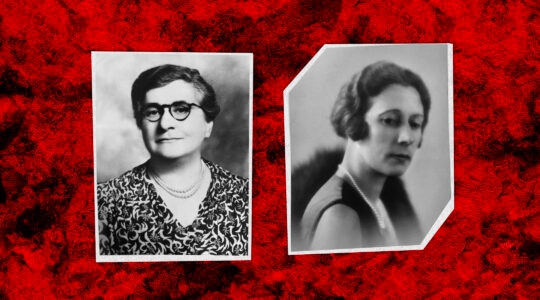Jewish clergy, seminaries, day schools and other nonprofits must not govern their own ethics systems. Most lack sufficient expertise and independence to earn and keep public trust in their capacity to self-regulate.
This conclusion comes hard to me. As a pulpit rabbi with a dual career in law and governance — and as past general counsel and then co-chair of Aleph: Alliance for Jewish Renewal — for years I believed that Jewish institutions could tend their own ethics matters. I believed that Jewish clergy and lay leaders — supposedly inclined to and trained in darchei chochmah (ways of wisdom) and darchei shalom (ways of peace) — could guide, support and control their own.
I was wrong.
My experience in Renewal — and a slew of recently confirmed ethics fumbles and cover-ups in Jewish clergy associations, day schools, summer camps and campus contexts — are just the latest examples of systematic ethics failures in Jewish institutions.
Whether alleged misconduct relates to sex, money, administration, asymmetric power or other ethics infractions, the Jewish context vastly raises the stakes. Alleged misconduct, or responses inviting fairness critique, can exacerbate emotional and spiritual damage when identity, values or faith are on the line. Ethics systems for clergy and schools teach and model ethics, so those systems especially must be above reproach.
Too many confirmed reports, however, depict Jewish ethics systems failing. Reports show whistleblowers gaslighted or shunned for seeking justice. Investigators lacking proper training commit flagrant fairness violations, even deciding matters without speaking to complainants. Confirmed offenders are sheltered to avert shame, or perhaps for career or political reasons.
Too many hurdles. Too little expertise. Too little proper support. Wrong understandings of justice and reconciliation. It’s a tribute to victims’ courage that they come forward at all.
No justice system is perfect, unfortunate cases shouldn’t necessarily drive policy change, and most ethics personnel do their best. But there have been too many unfortunate cases. More pointedly, no ethics systems can model independence, fairness and accountability by drawing personnel, power or legitimacy from the same circles they purport to govern.
Put simply, nobody’s best intentions can redeem insular ethics systems: they are too vulnerable structurally to unintentional biases. Often unconsciously, insular ethics systems risk affinity bias (judging based on similarity), attribution bias (judging reputation over evidence), availability bias (judging on data most readily accessible) and confirmation bias (affirming pre-existing beliefs). These biases, in turn, insidiously undermine transparency, trust and truth.
There also is little empirical or logical support for the premise that clergy, merely by training and serving as clergy, have sufficient tools and aptitude to undertake ethics inquiries for their own colleagues. The Talmud recorded long ago that independence and expertise in process and subject matter are vital to fair judgment and public trust. By contrast, today most Jewish clergy and other leaders don’t know about structural ethics, cognitive biases and fair procedures — yet they still self-regulate in the ethics arena.
The urgent need for Jewish ethics reform doesn’t assume bad faith. It should be enough that well-meaning people who train or serve together in the same seminary, clergy association or other stream of influence inherently risk unconscious biases of familiarity and affinity. These natural dynamics should disqualify ethics self-regulation outright. And unfortunately, a candid assessment of ethics must acknowledge that some institutions wielding spiritual authority have both cause and means to self-protect, with deeply disturbing ethical and spiritual implications.
It’s time to end the damaging and sometimes dangerous practice of Jewish institutions policing their own ethics. Jewish life needs a new and functionally independent ethics regime. Only an independent ethics system can set rules, field complaints, conduct inquiries, support the parties and issue findings without the reality or reasonable appearance of taint by insularity or bias.
An independent ethics regime would reduce actual and perceived protectionism, and enhance safety and objectivity. Victims would be more likely to come forward. Inquiries would be more likely to air all relevant evidence clearly. Accountability findings would be more fully honored, free of instantiating context. Exonerations would be less susceptible to mistrust. Most of all, the public would be more confident that Jewish institutions put ethics and transparency first.
This proposal is not perfect: it preserves institutional autonomy to decide what outcomes should follow findings. No school, seminary, clergy group or other nonprofit would outsource core academic, employment, ordination or membership decisions. Even so, institutions would feel healthy pressure to honor a truly honorable ethics system’s procedures and findings.
Structural ethics reform will take time, funds and collaboration. Until then, a stopgap step could swap ethics officials among existing systems. Conservative, Reconstructing Judaism, Reform, Renewal and Orthodox systems could cross-designate each other to receive ethics referrals, investigate claims and issue findings under the referring context’s standards. This stopgap step would require its own careful collaboration, but promptly it would reduce both the appearance and any reality of bias or self-dealing until a new ethics regime can come into force.
By working together to move ethics enforcement outside insular circles, Jewish life can be a needed light unto the nations — and a needed light unto the souls of millions who deserve the most ethical Jewish institutions that courage and creativity can offer.
Rabbi David Evan Markus is spiritual leader of Temple Beth El of City Island, co-founder of Bayit (a Jewish innovation start-up) and is on the faculty of the Academy of Jewish Religion and Aleph. By day, he presides as judicial referee as part of a parallel career in public service. The views expressed here are his own.
The New York Jewish Week brings you the stories behind the headlines, keeping you connected to Jewish life in New York. Help sustain the reporting you trust by donating today.




